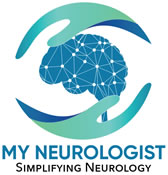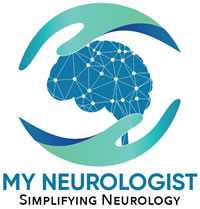What is an inflammatory myopathy?
It is a disease of muscles caused by an inflammatory process.
What may be the cause of inflammation in inflammatory myopathy?
It may be caused by a virus, a defect of immune system, mitochondrial disorder, or its cause may be unknown.
What are symptoms of inflammatory myopathy?
Patients usually develop symmetric weakness in muscles closer to their bodies, such as shoulders, or upper leg muscles. This may cause difficulty bringing arms above the head, or difficulty getting up from sitting position, or climbing stairs. Muscle weakness may also affect the muscles involved in swallowing and breathing, resulting in aspiration or difficulty breathing.
How is inflammatory myopathy diagnosed?
It can be suspected when a patient has its typical symptoms, and in some cases high level of a muscle enzyme called creatine phosphokinase (CPK or CK). It can be confirmed by muscle biopsy. Sometimes, imaging of muscles with MRI may also help in making the diagnosis.
What is the value of muscle enzymes in diagnosis of inflammatory myopathy?
Muscle enzymes like CK can help to make the diagnosis, but one should be careful interpreting the test as its level can be high for other reasons like trauma to muscles, or neuropathy. In some conditions like dermatomyositis, CK level may not be elevated. In some of these conditions, aldolase level may be high. Mild to moderate elevation of CK needs careful interpretation.
What is the value of different antibodies in diagnosis of inflammatory myopathy?
This is an evolving subject as newer antibodies are discovered and added to the list of antibody testing. Some antibodies are more specific to a particular type of myopathy, while many others are non-specific. Some of them are listed below with the type of myopathy.
What are different types of inflammatory myopathies?
- Viral myopathy: With associated viral syndrome like cold or flu
- Dermatomyositis: Associated with antibodies (Anti-Mi-2, Anti-TIFI-V, Anti-NXP-2, Anti-MDA-5, Anti-SAE)
- Anti-synthetase syndrome: Associated with antibodies (Anti-Jo-1, Anti-PL-7, Anti-PL-12, Anti-OJ, Anti-EJ)
- Immune mediated necrotizing: Associated with antibodies (Anti-signal recognition particle, Anti-3-hydroxy3-methylgluaryl coenzyme A(Anti-HMG-CoA) reductase, anti-mitochondrial)
- Unknown cause
Does EMG/NCS study help in diagnosing inflammatory myopathy?
EMG/Nerve conduction studies are very helpful to rule out many conditions of nerve and muscles causing similar symptoms, and to confirm a muscle pathology, but they are not specific to diagnose any one type of myopathy.
How does MRI help to diagnose inflammatory myopathy?
MRI can be useful in some cases to confirm swelling and changes due to inflammatory type of myopathy, but it does not provide specific information about any one type.
What is the best or the most specific test for inflammatory myopathy?
Muscle biopsy remains the best test to diagnose inflammatory myopathies, especially with additional antibody testing.
How are inflammatory myopathies treated?
Following is an overview of treatment:
- Dermatomyositis: High dose oral steroids with slow taper, steroid sparing drugs (mycophenolate, azathioprine, methotrexate, etc.), IV Ig, rituximab, cyclosporine, tacrolimus, and cyclophosphamide. Additional biological agents are being added to the treatment list.
- Immune checkpoint inhibitor related myositis: Oral steroids and IV Ig.
- Covid related myopathy: Treatment of underlying Covid.
- Idiopathic myositis: Oral steroids, and steroid sparing drugs.
Where can I find more information about inflammatory myopathy?
American Association of Neuromuscular & Electrodiagnostic Medicine


Leave a Reply
Your email is safe with us.
You must be logged in to post a comment.